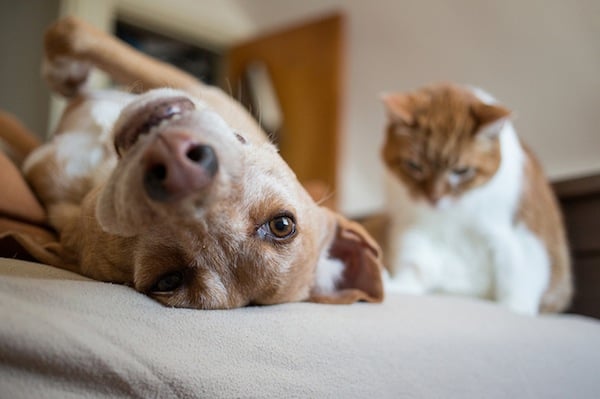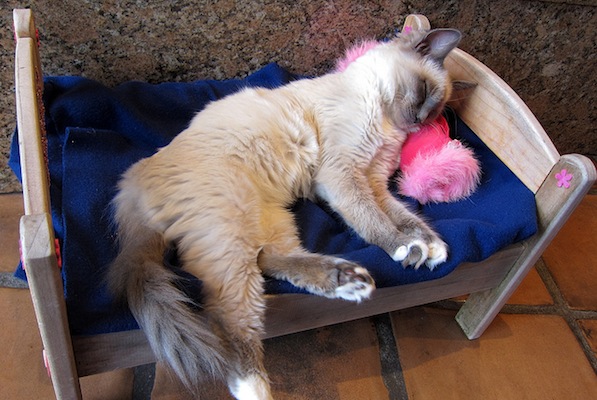When you love your pet like family, forcing them to sleep all alone can feel a little cruel. But when you open up your comfortable mattress to your dog or cat, your sleep can start to suffer big time.
Still, tons of us are doing it. According to a recent American Pet Products Association survey, 62% of cats and small dogs, 41% of medium-sized dogs, and 32% of large dogs sleep with their owners.
But let’s face it: Whether we need seven hours of sleep or eight, most of us simply aren’t getting enough to begin with. And when you let your pet sleep in your bed, the picture tends to get even worse. According to research presented earlier this year at the annual meeting of the Associated Professional Sleep Societies:
- 30% of pet owners who let their furry friends sleep in bed say that their pets wake them up at least once a night.
- Among pet owners who share a bed with Rover or Mittens more than four nights a week, 63% say that have poor sleep quality.
- Finally, 5% of pet owners say that they always or almost always have trouble falling back asleep after being disturbed by a pet.
We continue to tolerate the disruptions and difficulties falling back asleep because we care about our pets and feel comforted by them. But at the very least, it’s worth taking a look at the downsides of letting your pet sleep in your bed. That way, you can take control of your sleep habits and do what’s best for you.
How letting a pet sleep in your bed is disruptive.
There’s no doubt that having a furry friend in your bed will result in the occasional middle-of-the-night wake up. But research suggests that the problem occurs more than just once in a while.
In a British survey of 1,000 pet owners, more than half claimed to lose 90 minutes of sleep per night thanks to their companion animal. Apparently, that’s because our pets are doing a lot of stuff throughout the night. Case in point:
- 47% of pet owners say their dog or cat barks or mews “incessantly.”
- 28% of pet owners say their dog or cat tries to claw its way in to cuddle closer. Ouch.
- 3% of pet owners say they’ve woken up to their pet biting them. (To which we say, WHAT?!)
Thing is, our four-legged friends don’t necessarily have to be trying to get our attention to mess with our sleep. Even the sweetest dog or cat will move around and change positions during the night to get comfortable—and if you’re a light snoozer, that in itself could be enough to rouse you.
Why disrupted sleep is so bad.

After nodding off at night, your brain goes through several stages of sleep in order to help you fully rest up and recharge. First, you get drowsy, and are on your way to falling asleep. Then there’s light sleep, when your heart rate slows and body temperature drops.
Next up? Deep sleep, when the body works to regrow tissue, build bone and muscle, and strengthen your immune system. (It’s also the time when sleepwalkers might start roaming around. Watch out!)
After deep sleep comes REM sleep, which stands for rapid eye movement. REM sleep starts about 90 minutes after you start snoozing, and occurs several times throughout the night. During REM sleep, your brain is active and you can experience intense dreams.
But if you get disturbed during REM sleep, your body won’t follow the normal sleep cycle next time you nod off. Instead, you’ll slip right back into REM sleep and stay there until you catch up on what you missed. Next thing you know, your whole sleep cycle is jammed up.
And when your sleep cycle gets interrupted regularly, things start to spiral downwards pretty quickly. Findings published last year suggest that just one week of poor sleep can disrupt hundreds of genes in your body and increase stress, suppress immunity, and spike inflammation.
When that happens, you start losing the ability to staying sharp at work, maintain a healthy weight, and fight off illness. All thanks to your fluffy (if not well-meaning) companion.
The air quality problem.
Snoozing with a dog or cat is a surefire way to disrupt your sleep at least a little bit. But if you have allergies, asthma, or are sensitive to poor air quality, all that fur in your bed could also be making it harder to breathe.
In fact, experts say that pet owners who suffer from allergies or asthma shouldn’t allow dogs or cats in the bedroom, period. Having a fur-free zone guarantees you have at least some time to recover after being around your pet during the day. And even with your bedroom off limits, it’s a good idea to use a HEPA filter to make sure your indoor air is super squeaky clean.
How to sleep better with a pet.

So should you let your dog or cat sleep in the bed or not? The answer, docs say, really amounts to personal preference.
If you have asthma or allergies, you should keep your pet out of your bedroom. But if you don’t, take some time to honestly consider how well you’re sleeping at night. If you usually wake up feeling rested and refreshed, then it’s totally fine to continue sharing the bed with your dog or cat.
But if you still feel groggy when you wake up or find yourself feeling fatigued throughout the day, it might be worth experimenting with sleeping solo. Ditto if you’re already prone to sleeping problems, since having a pet in your bed can mess with the healthy sleep environment that you’re trying to achieve.
Sometimes, though, kicking a pet out can be easier said than done. Once a cat has been allowed to sleep in your bedroom, they can become frustrated and destructive if you try to shut them out. It’s better to keep them out of your bed in the first place, behaviorists say. But if you’re making changes with a cat that’s gotten used to your bed, try offering them something to do at night while you sleep—like foraging toys or window side perch so they can watch outside.
With dogs, it’s usually just a matter of training. Make staying off the bed fun by rewarding your pooch with praise or treats, and they’re more likely to be receptive. The opposite is also true: If you want your dog off the bed, don’t give him any attention when he’s on it. Soon, he’ll get the message. Instead purchase a comfortable dog bed for your four-legged friend that they can’t resist.
Of course, you might be in for a few sleepless nights in the beginning. But after a few weeks, your pet will become used to the new normal. And you? You’ll start getting better sleep.
Pet owners, do you let your dog or cat sleep in the bed with you? Why or why not?
About the author
Marygrace Taylor is an award-winning health writer for Amerisleep. Her commitment to sleep health is evident in her ability to consistently prioritize eight hours of sleep each night. Her in-depth interviews with industry experts, such as Ken Ceder on "Why Light is Essential for Great Sleep and Optimum Health," highlight her dedication to delivering valuable insights. Marygrace's work has been featured in reputable publications like Business Insider, Glamour, Refinery29, Metro UK, and Hunker, further solidifying her expertise in the field.
View all posts




